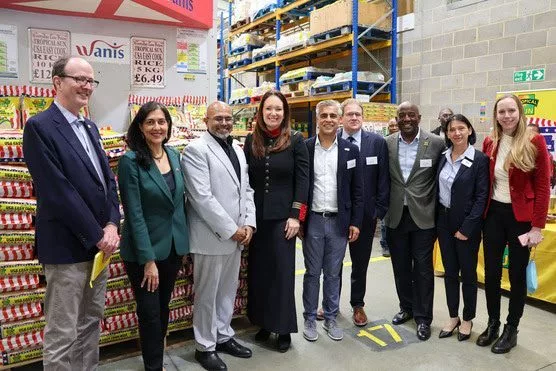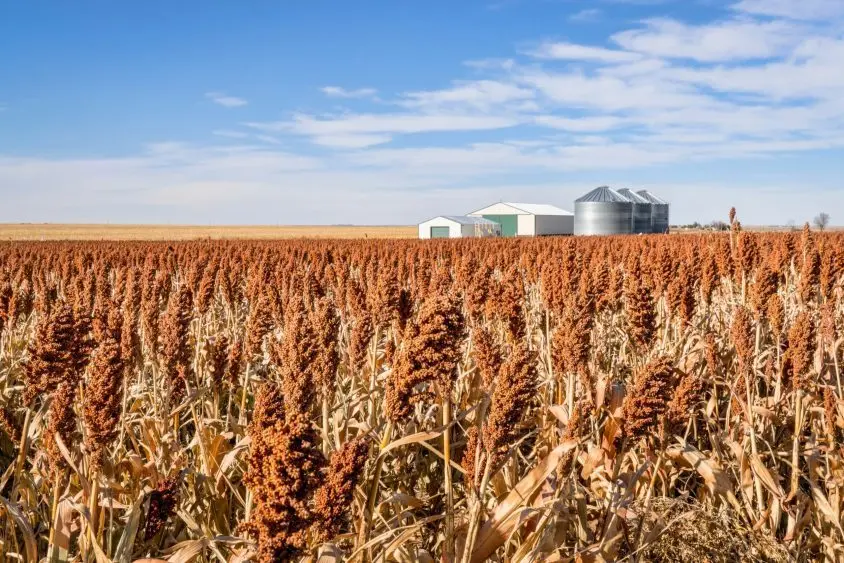
(Washington D.C.) – U.S. Secretary of Agriculture Brooke Rollins concludes the final day of her trade delegation visit to the United Kingdom. This visit comes after President Donald J. Trump announced last week, on the 80th anniversary of Victory Day for World War II, a historic U.K. trade deal that will lower tariffs, remove trade barriers, increase market access, and strengthen cooperation on economic security.
“This trade delegation to the U.K. has been essential to put U.S. Farmers First on the world stage and expand market access for the bounty of American Agriculture. I was able to build on critical bilateral relationships and advocate on behalf of American farmers and ranchers directly. Our farmers and ranchers produce the safest, highest quality food in the world, and I can’t wait for consumers ‘across the pond’ to get more of a taste of the beef, poultry, pork, seafood, rice, specialty crops, and all the agricultural exports America has to offer,” said Secretary Rollins.
Day One:
On the first day, Secretary Rollins met with U.S. Ambassador to the U.K. Warren Stephens, held a U.S. agricultural industry cooperators roundtable meeting, and visited Parliament to meet with Secretary of the Department for Environment, Food and Rural Affairs (DEFRA) Rt. Hon. Steve Reed, and Secretary of State for the Department of Business and Trade (DBT) Rt. Hon. Jonathan Reynolds.
Secretary Rollins was the first member of President Trump’s Cabinet to meet with the new U.S. Ambassador to the U.K., Warren Stephens, on Day One of his mission at the U.S. Embassy in London. The Secretary and Ambassador discussed U.S. agriculture trade priorities for the U.K. market following the historic announcement of the Economic Prosperity Deal, including non-tariff barriers facing U.S. agricultural products, the regulation of products based on a science-based risk approach to ensure food safety, as well as allowing greater choice for U.K. consumers. While at the U.S. Embassy, Secretary Rollins met with U.S. farmers and representatives of U.S. agricultural products, who shared major successes and hurdles competing in the U.K. and global markets. These representatives shared the vital importance of USDA export promotion programs and USDA offices overseas, which help facilitate increased exports of U.S. agricultural products, increase profits for U.S. producers, and boost value-add for farming communities across the United States.
After meeting with Ambassador Stephens and hearing from U.S. agriculture representatives at the U.S. Embassy, Secretary Rollins visited Parliament to meet with U.K. leaders, who shared their optimism that the historic Economic Prosperity Deal would be the framework for continued engagement on market access, collaboration, and reciprocal trade to benefit both U.S. and U.K. producers and consumers. The two delegations discussed the importance of the Special Relationship between our two nations, and Secretary Rollins advocated for U.S. agricultural products, including bivalve mollusks, dairy, rice, beef, poultry, pork, and produce, noting the importance of providing U.K. consumers choice in the products they choose to consume. Importantly, Secretary Rollins noted the U.S. produces safe and nutritious beef, pork, and poultry products and worked throughout her mission to dispel fake news media narratives and headlines regarding these products that have been pushed by British media for decades.
Day Two:
On day two, Secretary Rollins observed key parts of the supply chain for American goods in U.K. markets, visited 10 Downing Street to meet with the U.K.’s top trade advisor, and met with leadership at the U.K. Department for Energy Security (DESNZ). During meetings with U.K. industry leaders representing hotels/restaurants, food manufacturing, fresh produce and vegetables, meat, and animal feed/grain the Secretary highlighted opportunities to build on the recent announcement of President Trump’s Economic Prosperity Deal to boost choices for U.K. consumers, the elevation of farmers and the farming community by the Trump administration, and the importance of regulatory alignment between our two nations. The industry representatives also shared challenges facing their sectors, including new taxes, regulations, and food inflation, and shared their strong desire for predictable and reliable trading partners such as the United States.
Next, Secretary Rollins visited Wanis Limited, a wholesaler, and the Tilda Rice Milling LTD and S&B Herba, a milling and packing facility. During these visits, the Secretary was able to see the process by which an international wholesaler distributes multiple U.S. branded rice products and provides variety and choice in high quality U.S. products to U.K. consumers. Additionally, the Secretary met with a rice farmer from Arkansas, USA Rice, and the U.K. Rice Milling Association to discuss the importance of the rice milling industry in the U.K. and additional opportunities for U.S. un-milled rice exports to the U.K. Representatives of Tilda highlighted the trusted reputation of U.S. rice in the U.K., and Secretary Rollins noted the opportunity to simplify and align regulatory systems for the benefit of both countries.
Following the meetings with industry leaders, Secretary Rollins and the U.S. delegation visited 10 Downing Street to meet with Varun Chandra, the Prime Minister’s Special Adviser on Business and Investment. During this discussion, Secretary Rollins noted the importance of aligning more closely on regulatory framework, the opportunity for increased trade between the two nations, including the benefit of choice for U.K. consumers, and discussed the ongoing U.S.-U.K. trade negotiations.
Secretary Rollins wrapped up a very successful day two visit in London by meeting with leadership from the U.K. Department for Energy Security (DESNZ), including Secretary of State Ed Miliband and Minister for Energy Shanks. During this visit, Secretary Rollins noted the importance of U.S. biofuels, ethanol, and biomass for the U.K. energy sector. The Secretary advocated for additional imports of U.S. wood pellets to the U.K. Finally, the Secretary highlighted the beneficial role U.S. biofuels and ethanol, including E10 and E15, could provide to the U.K. energy portfolio. These productive meetings were just the beginning of a partnership and cooperation between the two nations on these important national security topics.

Day Three:
On the final half-day of her visit to the U.K., Secretary Rollins visited the newest retail location for Whole Foods U.K. and showcased signature U.S. brands on U.K. grocery store shelves. The team at Whole Foods provided insight on on-going discussions to bring additional products to the U.K. market, the sophistication of product branding that imported U.S. products need to attract U.K. consumers, and the benefit USDA funding provides to promote new U.S. products. Additionally, the Secretary heard stories of success of Alaskan seafood products sold at the store and was able to view Texas hot sauces and condiments proudly displayed on Whole Foods shelves.
Overall:
Secretary Rollins has made it a top priority to advocate on behalf of American agriculture. This means increasing access for American products in existing markets, opening new markets with strong demand for our products, and making sure trading partners are treating American farmers, ranchers, and producers fairly.
While in the U.K., Secretary Rollins secured major wins for American exporters of energy resources, including fair market access for wood pellets to be utilized to support energy production in the U.K., as well as additional opportunities to import ethanol produced in the U.S. Secretary Rollins also highlighted additional opportunities for U.S. un-milled rice exports to the U.K. and advocated for the U.S. seafood industry and U.S. dairy products, which are unfairly targeted by risk classifications or are only accepted due to minor technicalities that can be addressed through partnerships between the U.S. and U.K. governments. Throughout her visit, Secretary Rollins fought to improve the public misperception about the safety, quality, and consistency of America’s agricultural products. Through conversations with American farmers who export to the U.K., she confirmed they are interested in exporting more products, and U.K. importers and retailers are interested in selling and promoting more American agricultural goods.
The success of this first international trade mission follows four years of inaction by the Biden Administration, which caused the agricultural trade balance to go from a trade surplus under President Trump to a significant trade deficit under President Biden. Following this trip, Secretary Rollins will travel to Italy, Japan, Vietnam, India, Peru, and Brazil over the next four months. Other USDA Trade Missions this year include the Dominican Republic, Taiwan, Côte d’Ivoire, and Mexico.



